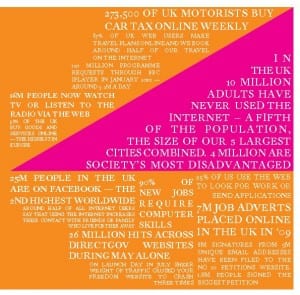The proposed model for ‘digital by default’ services has been described as revolution rather than evolution. (Directgov 2010 and Beyond: Revolution Not Evolution) Driven by the search for efficiency savings, the proposal is to merge disparate government services into a single point of delivery at the Direct.gov.uk website with all content being produced by a single government department.
“…we believe its time to move onto a new phase of convergence, by rationalizing and converging all departmental websites and their content…onto shared web services, supported by a set of common web standards.” Directgov Strategic Review (2010: 2)
This reinvention of the government online publishing system is estimated to significantly reduce their web expenditure. Presumably in order to afford the cost of the new system being set up to support the application, award and management of Universal Credit next year. This in spite of the recent System Error report from the Institute for Government Think Tank which documents “too many high-profile and costly failures” (2011: 2) and where “Most attempts to solve the problems with government IT have treated the symptoms rather than resolved the underlying system-wide problems. This has simply led to doing the wrong things ‘better’”. (ibid p9).
On the surface, the language of single site delivery is encouraging; documentation refers to functionality, quality, common content standards and building services around people’s needs. It is technically possible to design and deliver content in a way which allows people to choose their preferred mode of access and these plans to achieve digital-only services by 2015 offer a real opportunity for bridging digital divides.
However, there is also the issue of conversion to ‘digital by default’ services. Called ‘channel shift’, this is a massive exercise in behaviour modification. Persuading people to move from face-to-face to digital ways of working is reminiscent of the arrival of virtual learning environments, and the adoption of digital pedagogies, over a decade ago. In 2011, not everyone across the sector can demonstrate confidence and competence with digital ways of working, and this raises questions about the reality of the government plans. While they are likely to achieve their ‘digital by default’ ambitions by 2015, it is unlikely they will have achieved a state of digital inclusion as well.
